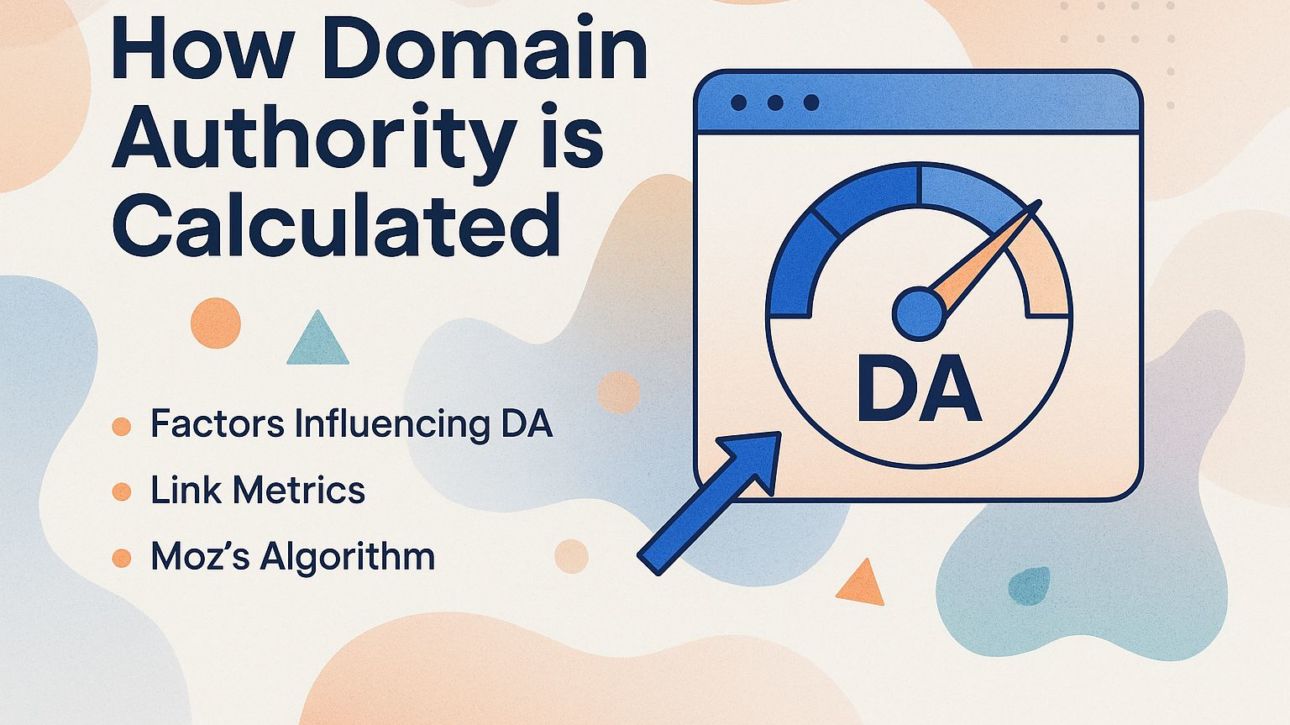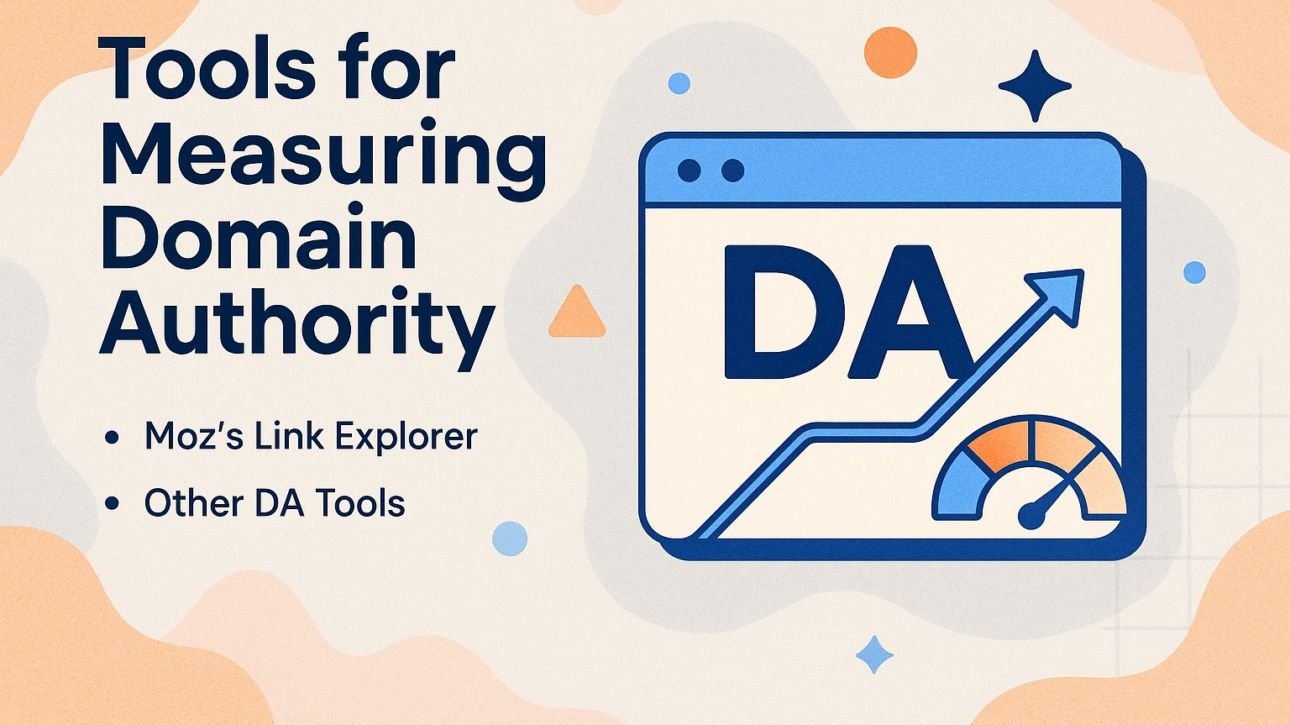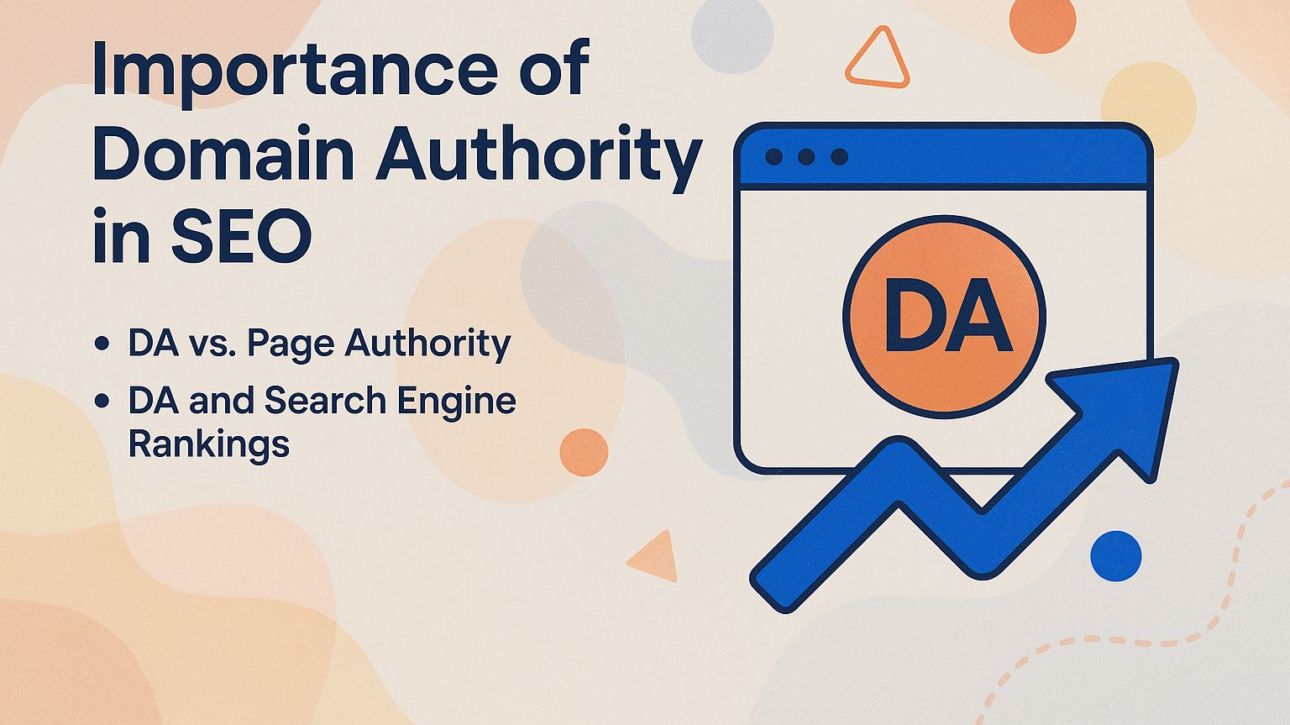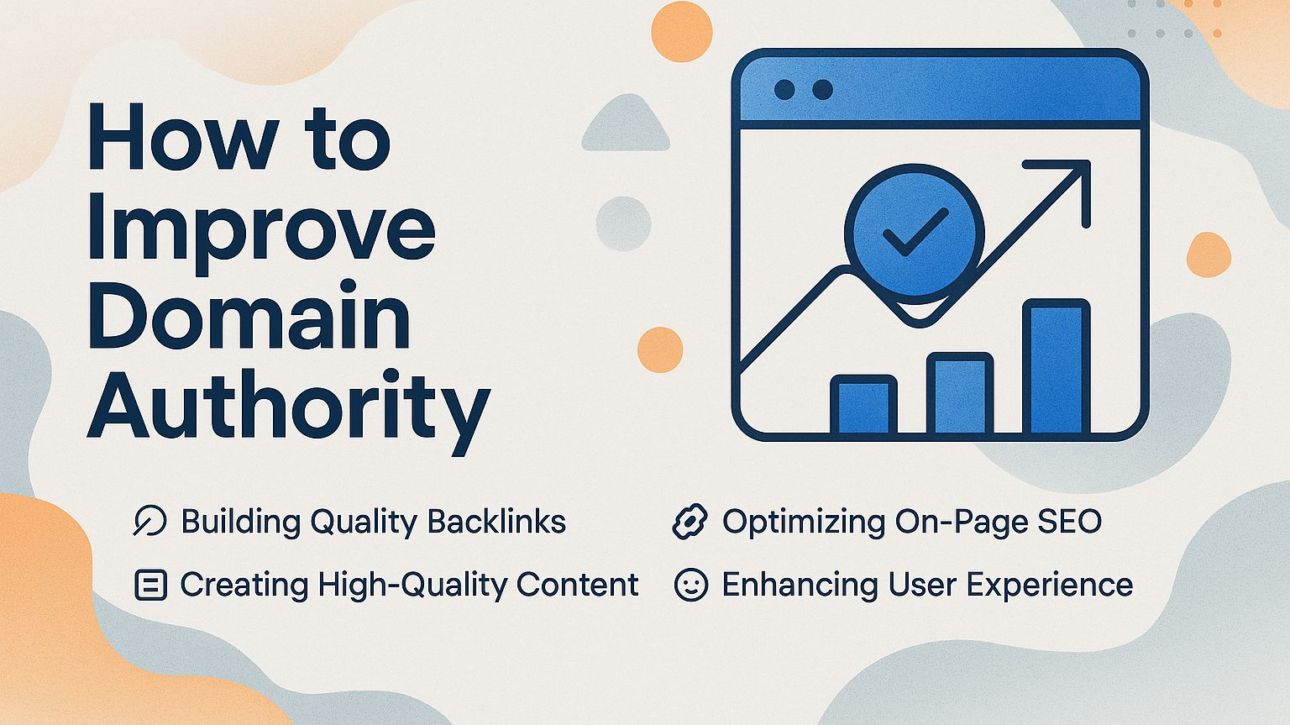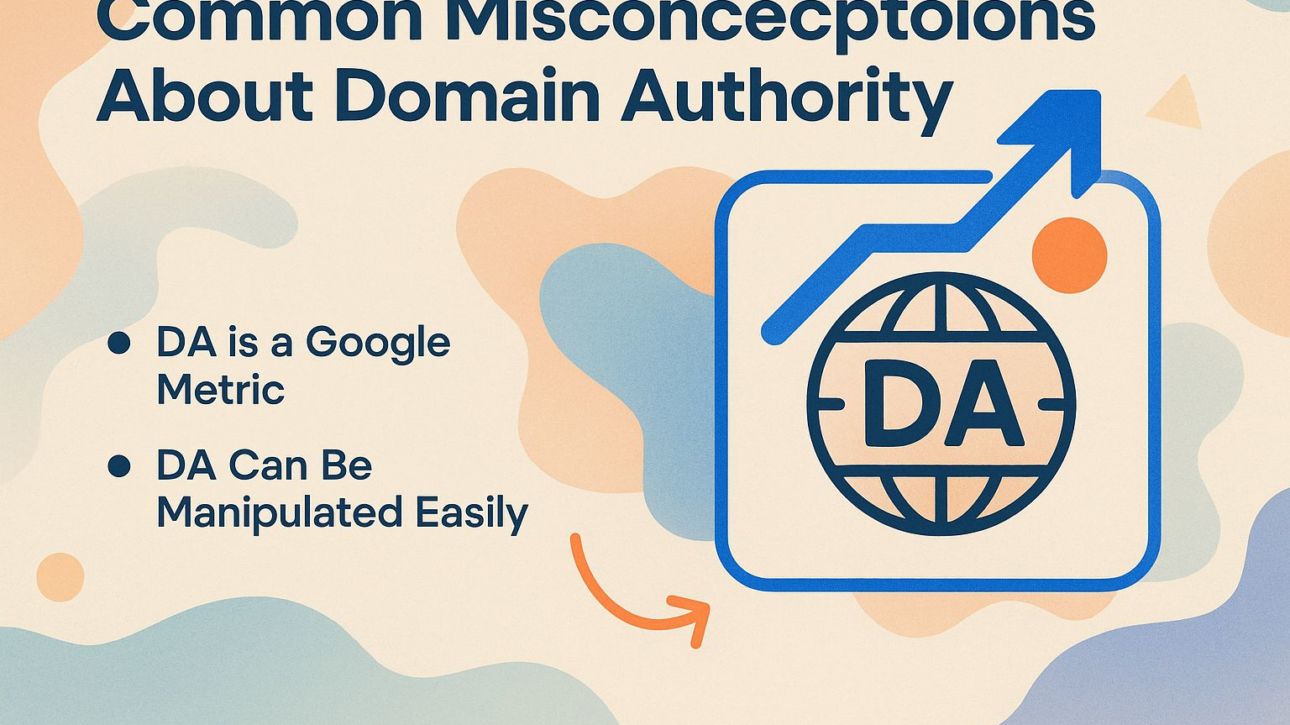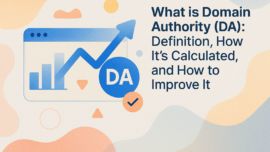
Knowing Domain Authority (DA) is important for anyone who wants to improve their website’s presence on search engines. Developed by Moz, this ranking score reflects your site’s potential to rank higher on Google based on various factors, including backlink data. In this article, we’ll explain what Domain Authority is, discuss how it’s measured, and give practical advice to improve your DA, helping you succeed in SEO.
Key Takeaways:
- Domain authority is an SEO metric that predicts a website’s ranking on search engine result pages.
- It is calculated based on factors such as link quality, quantity, and website authority, using Moz’s algorithm.
- To raise domain authority, concentrate on getting good backlinks, improving on-page SEO, making excellent content, and improving user experience.
Contents
- Definition of Domain Authority
- How Domain Authority is Calculated
- Tools for Measuring Domain Authority
- Importance of Domain Authority in SEO
- How to Improve Domain Authority
- Common Misconceptions About Domain Authority
- Frequently Asked Questions
- 1. What is Domain Authority (DA)?
- 2. How is Domain Authority (DA) calculated?
- 3. How important is Domain Authority (DA) for SEO?
- 4. How can I check a website’s Domain Authority (DA) score?
- 5. How can I improve my website’s Domain Authority (DA) score?
- 6. Is Domain Authority (DA) the same as Page Authority (PA)?
1. Importance of Domain Authority
Domain Authority is important for a website’s performance in search engine results, affecting its visibility and traffic.
A higher Domain Authority (DA) score is often linked to improved search engine rankings, which is important for digital marketers.
To increase DA, concentrate on getting good backlinks from well-known sites, as these build trust. If you’re interested in enhancing your link-building strategies, our resource on link building: strategies, benefits, and best practices provides valuable insights.
Tools like Moz’s Link Explorer can identify opportunities for creating links. Regular content updates and optimization for SEO best practices, such as using relevant keywords and improving site speed, also contribute to higher DA.
Checking your Domain Authority often using tools such as Ahrefs or SEMrush can give information for comparing with competitors and changing your approach.
2. Overview of SEO Metrics
To grasp Domain Authority, you need to know about different SEO measurements, like Page Authority, backlinks, and general site performance signals.
Page Authority (PA) measures the strength of specific pages on your site, helping you identify which content is most likely to rank.
Backlinks matter; prioritize good links instead of just many links in your plan-using tools like Ahrefs or Moz can help with checking your link information.
Site performance factors, including loading speed and mobile optimization, play significant roles in user experience and rankings.
By looking at these metrics as a group, you can build a complete SEO plan that improves visibility on search engine results pages (SERPs). See also: our guide on SEO techniques and best practices.
Definition of Domain Authority
Domain Authority is a score developed by Moz to estimate the chances of a website appearing in search engine results, based on its links from other sites.
1. What is Domain Authority?
Domain Authority quantifies a website’s authority based on its backlinks, providing a relative metric for comparison against competitors. It’s calculated on a scale from 1 to 100, incorporating factors such as the number of linking root domains, total backlinks, and the quality of those links.
Tools like Moz’s Link Explorer and Ahrefs can check your Domain Authority. To improve it, focus on acquiring high-quality backlinks from reputable sites within your niche.
Check your backlink list often and think about content methods such as writing guest posts or working with influencers, which can increase your credibility and bring more organic visitors.
2. Origin of the Term
The concept ‘Domain Authority’ was introduced by Moz to help evaluate how well a website might rank for search engine optimization.
Since its introduction, Domain Authority (DA) has evolved significantly. Initially, it used a logarithmic scale from 1 to 100 to predict how well a website would perform in search engine results.
Moz continuously updates its algorithms to reflect the changing SEO environment, incorporating factors like linking root domains and total backlinks.
Today, tools like MozBar or Ahrefs allow SEO professionals to easily assess DA, facilitating strategic decisions for backlinks and content marketing. Knowing about DA can help site owners focus on improving their online visibility.
How Domain Authority is Calculated
The calculation of Domain Authority depends on many elements that together show how powerful a domain is and how well it can rank. Understanding the role of different types of links, such as nofollow links, can also impact a domain’s authority.
Related insight: What is a Nofollow Link: Definition, Uses, and SEO Impact
1. Factors Influencing DA
Key factors influencing Domain Authority include the quality and quantity of backlinks, website age, and overall SEO health.
To improve your Domain Authority, start by getting backlinks; try to get high-quality links from well-known sites in your field. Tools like Ahrefs or Moz can help you track your backlink profile. Understanding concepts like link juice can be instrumental in enhancing your link-building strategy.
Next, consider your website’s age; older domains generally hold more authority, so be patient in building your online presence.
Improve your website’s SEO by focusing on details like meta tags, loading speed, and mobile compatibility. Regularly updating content and monitoring site performance with Google Analytics can also contribute positively to your Domain Authority over time.
2. Link Metrics
Link metrics, including the number of unique domains linking to your site, play a significant role in determining your Domain Authority score.
To improve your site’s link profile, focus on obtaining high-quality backlinks from authoritative sites in your niche. Begin by writing guest posts on industry websites to show your knowledge.
Use tools like Ahrefs or Moz to study how competitors build links and find new chances for your own links. Create content that people want to share, such as infographics or research articles, which often get links.
Regularly monitor your link profile to discern the impact of your efforts, aiming for a steady increase in unique linking domains over time.
3. Moz’s Algorithm
Moz’s method for figuring out Domain Authority uses more than 40 different factors to give a complete evaluation of how well a website can rank.
Key components include link metrics, which assess both the quantity and quality of backlinks, and site-level features like domain age and overall trustworthiness.
For instance, a site with a strong backlink profile from high-authority domains will typically rank better. Moz considers on-page factors, such as content relevance and keyword optimization, which directly influence user engagement.
By focusing on these areas-strengthening backlinks, enhancing content quality, and adhering to technical SEO rules-webmasters can increase their Domain Authority over time.
Tools for Measuring Domain Authority
Various tools can measure Domain Authority, helping users see their website’s link profile and authority level.
1. Moz’s Link Explorer
Moz’s Link Explorer provides detailed info on Domain Authority, backlinks, and site performance. It’s a key tool for SEO analysis.
Moz’s Link Explorer costs $99 per month. It allows you to check your site’s Domain Authority (DA) and see how it stacks up against your competitors.
Start by entering a domain to get important details like the total backlinks, anchor text distribution, and the authority of linking domains.
Use the comparison tool to check your DA against competitors. This can help you plan your backlink strategy.
Frequently check your metrics to see how well your SEO strategies are working, allowing you to adjust your plan based on actual results.
2. Other DA Tools
Besides Moz, tools such as SEOptimer and Ahrefs provide useful information on Domain Authority and overall site performance.
SEOptimer offers a free tool that checks websites for SEO, ease of use, speed, mobile-friendly features, and other factors. It’s ideal for beginners who want a clear report without paying.
Ahrefs, costing about $99 each month, provides features such as examining backlinks, studying keywords, and evaluating the condition of websites. These tools help experienced marketers thoroughly analyze their site’s performance.
By using these tools along with Moz, users can view their Domain Authority from different angles and find specific ways to make it better.
Importance of Domain Authority in SEO
Domain Authority is important for SEO because it affects a website’s credibility and how well it ranks in search engine results.
1. DA vs. Page Authority
While Domain Authority assesses site-wide rankings, Page Authority focuses on the ranking potential of a specific page within that site. These measurements give a complete view of how well SEO is working.
Domain Authority, ranging from 1 to 100, gives an overview of your entire domain’s strength based on linking root domains and total backlinks. On the other hand, Page Authority, using the same scale, measures how well a specific page might perform, focusing on factors relevant to that page.
By watching both, you can spot pages with a lot of promise that might need some work, like updating on-page SEO elements or adding more backlinks to make them easier to find.
2. DA and Search Engine Rankings
A higher Domain Authority correlates with better positioning in search engine rankings, particularly in competitive niches.
Domain Authority (DA) is influenced by various factors, including backlinks, site age, and content quality. Studies show that sites with a DA of 40+ rank significantly higher in search results compared to those below 20.
For instance, a case study on an e-commerce site revealed that improving its DA from 30 to 50 through quality backlink acquisition led to a 70% increase in organic traffic.
Tools like Moz and Ahrefs can help assess your DA and identify improvement opportunities through backlink audits and content optimization strategies.
How to Improve Domain Authority
Raising Domain Authority involves steps like developing links, improving web pages, generating content, and ensuring the site is easy to use.
1. Building Quality Backlinks
Having high-quality backlinks from reputable websites is important for increasing your Domain Authority score.
- Start by identifying relevant blogs and websites in your niche. Use tools like Ahrefs or Moz to check their backlink profiles and find new chances.
- For outreach, write custom emails that explain how your content helps their audience, and suggest writing guest posts. Engage with their social media posts to build rapport.
- Consistently track your efforts and results, adjusting your strategies based on which methods yield the best backlinks. This active method can greatly improve your site’s trustworthiness and presence over time.
2. Optimizing On-Page SEO
Good on-page SEO techniques, like improving titles, headers, and content layout, can greatly increase Domain Authority.
To improve your on-page SEO, begin by focusing on keyword use. Include main keywords smoothly in the title, the first 100 words, and headers (our guide to understanding keyword importance offers deeper insights on this topic).
Next, improve your internal linking by connecting related articles; this keeps visitors on your site longer and helps search engines understand your pages better.
Concentrate on metrics that indicate how users engage by reducing page load times. Use tools like Google PageSpeed Insights to identify problems.
Regularly refreshing old content also stimulates engagement and signals to search engines that your website is active and relevant.
3. Creating High-Quality Content
Creating quality content that connects with your audience can increase Domain Authority. To achieve this, develop a content calendar that aligns with your audience’s interests and key industry events.
Start by using tools like Google Analytics to examine who your audience is and what they like. Use BuzzSumo to find popular topics in your area, which can give you ideas for new posts.
Consistently batch-produce content around these themes, ensuring you maintain a diverse range of formats-such as articles, infographics, and videos-to cater to different engagement styles. Regularly revisit and adjust your strategy based on performance metrics.
4. Enhancing User Experience
A smooth user experience with fast website loading and mobile-friendly options is essential for retaining visitors and boosting Domain Authority.
- To make your site faster, use GTmetrix to check its performance.
- Use TinyPNG to reduce image size, and Autoptimize to improve CSS and JavaScript.
To make sure your site works well on different screen sizes, use responsive design tools like Bootstrap.
Think about using a Content Delivery Network (CDN) such as Cloudflare to share content worldwide, which helps make websites faster.
Regularly check your site’s performance to maintain high standards, aiming for a load time under three seconds.
Common Misconceptions About Domain Authority
Many misconceptions about Domain Authority can lead to wrong SEO strategies, which can negatively affect website performance.
1. DA is a Google Metric
Many people think Domain Authority is a Google measurement, but it’s actually a separate rating created by Moz.
Domain Authority (DA) estimates how likely a website is to rank in search engine results. It ranges from 1 to 100 and is influenced by factors like backlink quantity and quality.
For effective SEO strategies, focus on improving your site’s content quality and acquiring high-quality backlinks from reputable sources.
Tools like Ahrefs and Moz can help identify your current DA and track improvements. Regularly check these metrics to improve your strategy because a higher Domain Authority usually means better search visibility.
2. DA Can Be Manipulated Easily
Contrary to belief, manipulating Domain Authority through spamming backlinks is ineffective and can lead to penalties from search engines.
Instead of using risky methods, concentrate on long-term plans to improve your Domain Authority.
Start by creating high-quality, relevant content that naturally attracts backlinks. Engage in outreach to industry influencers to secure guest posting opportunities.
Tools like Moz or Ahrefs can help you analyze your backlink profile, identify authoritative websites for collaboration, and track your progress over time.
Frequently improving your site’s technical features, such as speeding up page loading times and ensuring compatibility with mobile devices, enhances your website’s standing with search engines.
Frequently Asked Questions
1. What is Domain Authority (DA)?
Domain Authority (DA) is a metric used to measure the overall strength and authority of a website. It is a score on a scale of 1 to 100, with higher scores indicating a stronger online presence and potential for higher search engine rankings.
2. How is Domain Authority (DA) calculated?
Domain Authority (DA) is calculated by evaluating various factors such as the number and quality of inbound links, the age of the domain, and the overall quality of the website’s content. It is constantly updated and can fluctuate based on changes to these factors.
3. How important is Domain Authority (DA) for SEO?
Domain Authority (DA) is an important factor in search engine optimization (SEO) as it can have a significant impact on a website’s search engine rankings. A higher DA score can lead to better visibility and higher organic traffic from search engines.
4. How can I check a website’s Domain Authority (DA) score?
You can use online tools like Moz’s Link Explorer and Ahrefs to find out a website’s Domain Authority (DA) score. Simply enter the website’s URL and the tool will provide the DA score along with other relevant metrics.
5. How can I improve my website’s Domain Authority (DA) score?
To improve your website’s Domain Authority (DA) score, focus on creating high-quality content and obtaining backlinks from reputable and relevant websites. Regularly refreshing and improving your website can help increase your DA score.
6. Is Domain Authority (DA) the same as Page Authority (PA)?
No, Domain Authority (DA) and Page Authority (PA) are two different metrics. While DA measures the strength and authority of the entire domain, PA measures the strength and authority of a specific webpage. Both are important for SEO and should be considered when evaluating a website’s online presence.


